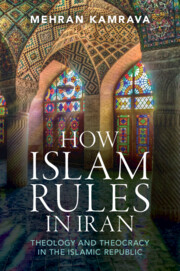Book contents
- How Islam Rules in Iran
- How Islam Rules in Iran
- Copyright page
- Contents
- Preface
- 1 Introduction
- 2 The Setting
- 3 A Question of Jurisprudence
- 4 Social Protection and Guidance
- 5 Rethinking the Islamic Republic
- 6 Theorizing Islamic Democracy
- 7 Legitimate Authority
- 8 Khameneism and the Absolute Velayat-e Faqih
- 9 Whither the Islamic Republic?
- Appendix Brief Biography of Some of the Figures Discussed
- Glossary
- Bibliography
- Index
3 - A Question of Jurisprudence
Published online by Cambridge University Press: 02 May 2024
- How Islam Rules in Iran
- How Islam Rules in Iran
- Copyright page
- Contents
- Preface
- 1 Introduction
- 2 The Setting
- 3 A Question of Jurisprudence
- 4 Social Protection and Guidance
- 5 Rethinking the Islamic Republic
- 6 Theorizing Islamic Democracy
- 7 Legitimate Authority
- 8 Khameneism and the Absolute Velayat-e Faqih
- 9 Whither the Islamic Republic?
- Appendix Brief Biography of Some of the Figures Discussed
- Glossary
- Bibliography
- Index
Summary
Khomeini’s arguments were foundational to the Islamic Republic. The significance of his jurisprudential contributions and innovations cannot be overstated. For the first time, he theorized about direct rule by a faqih. He revolutionized the position of velayat-e faqih by taking it out of the social and cultural realms only and planting it firmly in the domain of politics. First, he made the velayat-e faqih a political supervisor, then a ruler, and finally an absolute ruler. Khomeini gave the absolute ruler the authority to issue injunctions that superseded the injunctions of religion if necessary and empowered him to decide on what was expedient and in the interest of the greater good. These ideas continue to remain foundational to the Islamic Republic. Today, Khomeini the ruler has been all but forgotten. His portraits continue to adorn government buildings, his mausoleum is a frequent stop for visiting dignitaries, and his legacy is duly praised on official occasions and in state ceremonies. But the state has long moved on from what one scholar aptly called “Khomeinism.” From the 1990s on, it has been “Khameneism” that has ruled Iran politically and jurisprudentially, with its own conceptions of velayat-e faqih.
Keywords
- Type
- Chapter
- Information
- How Islam Rules in IranTheology and Theocracy in the Islamic Republic, pp. 58 - 104Publisher: Cambridge University PressPrint publication year: 2024



